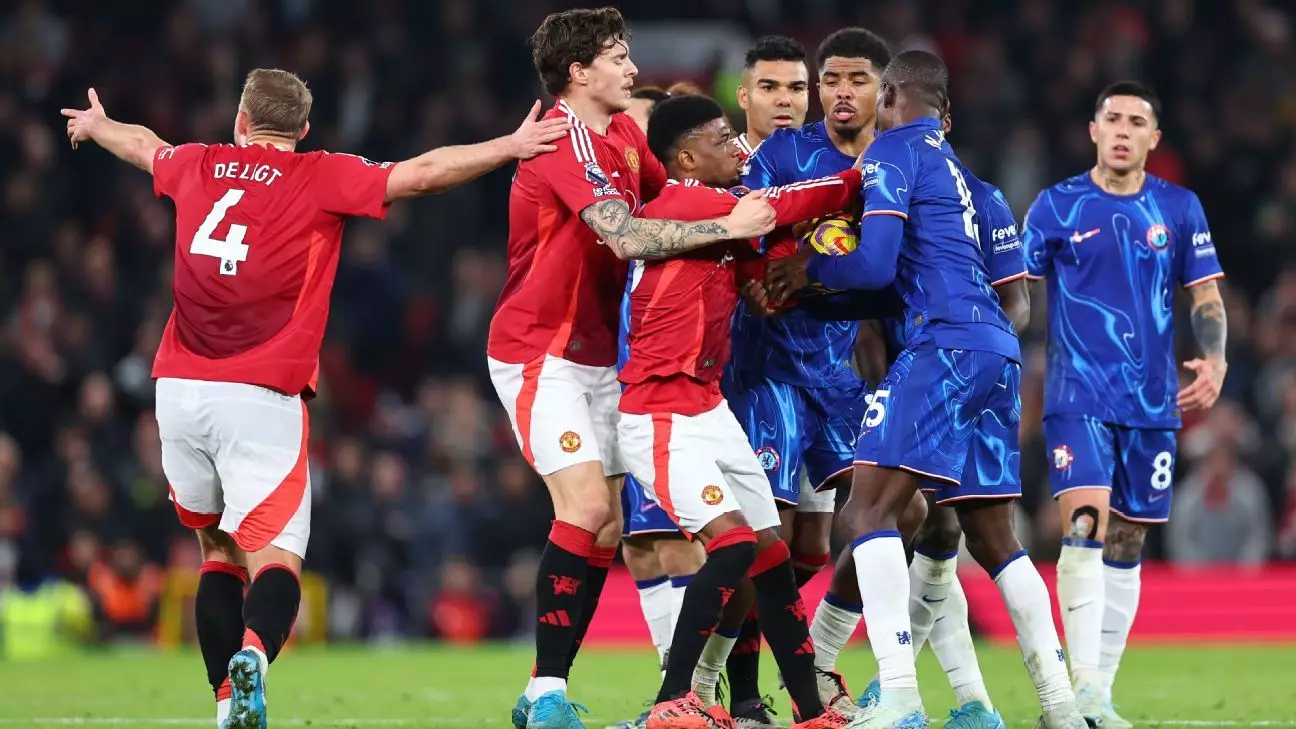The clash between Manchester United and Chelsea on Sunday at Old Trafford was a critical moment for both clubs, with Moisés Caicedo delivering a stark reminder of why he was such a coveted player in the transfer market. His stunning equalizer in the 74th minute not only ensured that Chelsea left Manchester with a point but also reflected poorly on United’s defensive organization. The goal demonstrated Caicedo’s technical prowess as he volleyed the ball with finesse after it fell from the sky. Such clinical finishing is often the difference in high-stakes matches, and for United, it served as a wake-up call about their ongoing issues in defense and midfield.
Despite managing to secure a penalty that temporarily placed United in the lead, they were unable to sustain their momentum—a recurring theme this season. Caicedo’s performance underscores the importance of having players who can change the game with a moment of brilliance. If United had been successful in acquiring him prior to his transfer to Chelsea, the narrative surrounding this match could have been different. Instead, they were reminded of what could have been while grappling with their own inadequacies.
Ruud van Nistelrooy’s tenure as interim coach has revealed glimpses of potential but also exposed deep-rooted issues within Manchester United’s setup. Since taking the reins following Erik ten Hag’s dismissal, Van Nistelrooy has shown a willingness to embrace a more attacking style of play. His tenure began brightly with a resounding 5-2 victory in the Carabao Cup against Leicester City, sparking hopes for a turnaround.
Yet, the cloudy clouds of Ten Hag’s strategic conservatism still loom large over the squad. Statistics show that United has led only 90 minutes in the Premier League this season, largely due to an inability to assert themselves offensively. The embarrassing fact that teams like Fulham and Southampton have outperformed United in terms of goals scored adds scrutiny to Van Nistelrooy’s approach. While he has encouraged a more forward-thinking mentality compared to his predecessor, the psychological scars inflicted by Ten Hag’s cautious tenure are evident in how players are reluctant to take risks—often opting for backward passes instead.
Van Nistelrooy’s frustration was palpable when defender Matthijs de Ligt overlooked a forward pass. The coach’s instinct to instill a more dynamic attacking philosophy has not yet reached full fruition, as players still exhibit a tendency to play it safe. With two consecutive games at the helm, the Dutchman has laid a foundation, but the psychological transition from a defensive to an attacking mindset is challenging when the players feel the weight of underperformance.
As van Nistelrooy prepares for upcoming matches, he is faced with the reality that changes must go beyond tactical tweaks. The lack of cohesion in defense, especially with players like De Ligt and Lisandro Martínez failing to demonstrate reliability under pressure, presents a significant challenge. Their combined performances against Chelsea highlighted alarming lapses and a lack of communication, raising doubts about their ability to handle high-stakes encounters.
The incoming appointment of Sporting CP’s Rúben Amorim as United’s new permanent manager could mark another transitional phase. Amorim will need to quickly assess whether the existing defenders can fit into his envisioned 3-4-3 formation, a style that requires agility and tactical intelligence. However, if the current defensive issues persist, he risks continuing the cycle of mediocrity that has plagued the club since Sir Alex Ferguson’s departure.
On the Chelsea side, Caicedo’s emergence has been underlined by his ability to assert dominance in the midfield—particularly during his battle against prominent figures such as Casemiro and Manuel Ugarte. This performance may spell trouble for Fernández, who, despite being touted as a major signing, finds himself grappling for game time. His recent exclusion from the starting XI after controversies only compounds his challenge to regain a prominent role in the squad.
For United, the question of player reliability looms large, not just among defenders but also among midfielders like Ugarte and Casemiro. Their subpar performances raise eyebrows amongst fans and pundits alike, with many questioning whether these high-profile signings can live up to their reputations. The lack of cohesion and understanding within the midfield and defense will be critical for Amorim to address if he is to restore Manchester United to its former glory.
In the wake of the 1-1 draw against Chelsea, it has become abundantly clear that Manchester United is navigating through a turbulent phase. Changes in managerial leadership and tactical adjustments must translate into improved on-field performance—something that requires the right alignment of players buying into a new philosophy. While van Nistelrooy’s interim stint offers a glimmer of hope, the specter of past struggles and ongoing defensive blunders will continue to haunt the club until significant progress is made. The forthcoming weeks under Amorim’s guidance will be vital as he attempts to inspire a resurgence and reestablish the Red Devils as a force within the Premier League.

